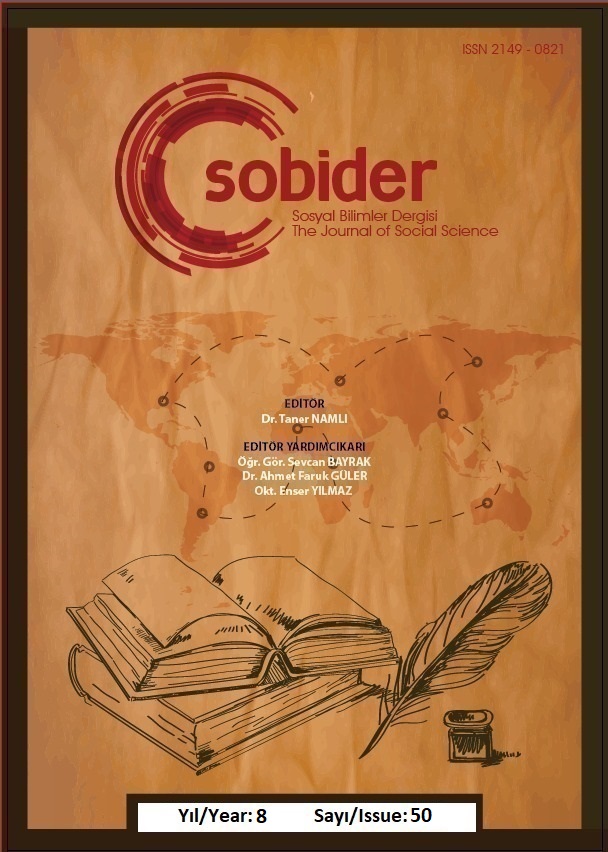Author :
Abstract
Çağdaş dönemde demokrasilerde Sivil Toplum Kuruluşları (STK), halkın kendi hür iradesiyle devletten bağımsız bir şekilde oluşturdukları kurumlar olarak önemli bir fonksiyon icra etmektedirler. İslâm’ın fert, toplum ve devlet planında gerçekleştirilebilecek emirleri açısından STK’lar dikkate alınması gereken kurumlardır. Maʻrufu, hayrı, yardımlaşmayı, erdemi, kötülükleri ortadan kaldırmayı emreden İslâm, müntesiplerini ikna etmek için bunları gerçekleştirme yolunda atılacak adımlara büyük ecir takdir etmektedir. Allah Teâlâ, Kur’ân’ın müteaddit yerlerinde mü’minlerin kardeş olduğunu ifade ederek aralarında yardımlaşmalarını, birlik olmalarını ve kenetlenmelerini emretmektedir. Nitekim Hz. Peygamber kendi hayatında Allah’ın emirlerini hayata yansıtırken toplumsallaşmayı ve dinî bütünlüğü hedeflemiştir. Onun Mekke döneminde Hılfü’l-fudûl hareketine dâhil olup destek vermesi, Medine’de ensarla muhacirler arasında kardeşlik ihdas etmesi, Medine sözleşmesini imzalaması hep siyasî ve sosyal birlik yolunda attığı önemli adımlardır. Bu suretle günümüzde Sivil Toplum Kuruluşları olarak adlandırılan örgütlenmelerin temellerini Hz. Peygamber’in hayatında bulmak mümkün olmaktadır. Çalışmanın amacı, İslâm’ın toplumsal yönünü oluşturan söz konusu hususların STK’ların faaliyetlerinde nasıl tezahür ettiğini ortaya koyarak bunların dinî ve sosyolojik referanslarını tespit edip değerlendirmektir.
Keywords
Abstract
In contemporary democracies, NGOs have an important function as institutions that are formed by the free will of the people and independently from the state. NGOs are the institutions that should be taken into consideration in terms of the orders of Islam that can be carried out in the individual, society and state plan. Islam is that orders to spread maʻruf, charitable, aid, the virtues, and to eliminate the evils, appreciates the steps taken towards fulfilling reward in order to convince their followers. In various parts of the Quran, Allah emphasizes that believers are brothers and sisters and He commands believers to cooperate together and to unite. As a matter of fact, The Prophet adopted the method of acting in integrity in his life while reflecting Allah's orders to life. Joining and supporting the Hılf al-fudūl movement during the Mecca period, establishing brotherhood between Ansār (helpers) and Muhājirūn (immigrants) in Medina, signing the Medina contract are all important steps he took towards political and social unity. Thus, today, it is possible to find the foundations of the organizations called Civil Society Organizations in the life of the Prophet. The aim of the study is to reveal how these issues, which form the social aspect of Islam, manifest in activities of NGOs to determine and evaluate the religious and sociological references of flours.
Keywords
- Akgül, M. (1995). “Sosyo-Kültürel Bir Kurum Olarak Vakıf ve Sosyal Dayanışma.” Diyanet İlim Dergi. 1 (31), 103-110.
- Akıncı, B. (2020). “Covid-19 Pandemisi Sonrasında Sivil Toplum Kuruluşları: Artçı Değişimlerin Sivil Toplum Kuruluşlarının İşlevsel Rollerine Yansımaları.” Journal of Social and Humanities Sciences Research. 7(55), 1809-1816.
- Akkır, R. (2019). “Din, Sosyalleşme Ve Toplumsal Uyum: Suriyeli Mülteciler Örneği.” e- Şarkiyat İlmi Araştırmalar Dergisi. 11 (2 (24)), 953-971.
- Aldemir, T. (2016). “Sivil Toplum Kuruluşlarının Toplumsal Birliği Sağlamadaki Başarı Düzeyinin Tahlili.” Toplumsal Birliğin Güçlendirilmesinde Dinî Söylemin Önemi. 427440.
- Aygen, Murat. (2018). “Türkiye’de Sivil Toplum Kuruluşları Misiad Örneği”. Fırat Üniversitesi İlahiyat Fakültesi Dergisi. 23/1, 139-164.
- el-Buhârî. Ebû Abdillâh Muhammed b. İsmâîl b. İbrâhîm el-Cu‛fî. el-Kütübü’s-sitte ve şürûhuhâ: Sahȋhu’l-Buhârî. İstanbul: Çağrı Yayınları; Tunus: Dâru Sahnûn. 1992/1413.
- Bayyiğit, M. (2001). “Sosyal Yardımlaşma ve Dayanışma Kurumu Olarak Vakıflar.” Selçuk Üniversitesi İlâhiyat Fakültesi Dergisi. Sayı: 11, 59-66.
- Coşkun, A. (2004). “Sosyal Bütünleşme, Sosyal Bütünleşme ve Din.” Din Eğitimi Araştırmaları Dergisi. Sayı: 13, 111-151.
- Coştu, Y. (2013). “Toplumsallaşma ve Din”. (Ed.) Niyazi Akyüz ve İhsan Çapcıoğlu. Din Sosyolojisi. 325-341. Ankara: Grafiker Yayınları.
- Çelik, C. (2013). “Sosyal Bütünleşme ve Din.” Din Sosyolojisi. Konya: Palet Yayınları.
- Çuhadar, S. (2020). “Sivil Toplum Kuruluşlarına Genel Bakış ve ANKOS”. İbn Haldun Çalışmaları Dergisi, 5 (2), 137-151.
- Günay, H. M. (2012). “Vakıf”. Türkiye Diyanet Vakfı İslâm Ansiklopedisi. İstanbul: TDV Yayınları, XLII, 475-479.
- Günay, Ü. (2013). “Toplumsal Bütünleşme ve Din”. (Ed. ) Niyazi Akyüz ve İhsan Çapcıoğlu. Din Sosyolojisi. 409-420. Ankara: Grafiker Yayınları.
- Günay, Ü. (2014). Din Sosyolojisi. İstanbul: İnsan Yayınları.
- İbn Mâce, Ebû Abdillâh Muhammed b. Yezȋd er-Rebei el-Kazvinî. es-Sünen. Beyrut: Dâru’l- Ceyl. 1998.
- İbnü’l-Cevzî, Ebü’l-Ferec Cemâlüddîn Abdurrahmân b. Alî b. Muhammed Bağdâdî. el-Münteha fî târihi’l-ümem ve’l-mülûk. Muhammed Abdülkâdir Atâ ve Abdülkadir Atâ, Beyrut: Dâru’l-Kütübi’l-İlmiyye, 1412/1992.
- Kaypak, Ş. (2012). “Yerel Yönetimlerde Katılımcı/Müzakereci Demokrasi Sürecinde Sivil Toplum Kuruluşlarının Önemi”. Uluslararası Yönetim İktisat ve İşletme Dergisi , 8 (17) , 171-196 .
- Keleş, A. (2013). “Yaşayan Sünnet ve Sosyal Hayat”. (Ed.) Mustafa Tekin. Sünnet Sosyolojisi. 311-330. Ankara: Eski Yeni Yayınları.
- Keyman, F. (2004). “Türkiye'de ve Avrupa'da Sivil Toplum”. (Haz.) Arzu Karamani. Sivil Toplum Kuruluşları Eğitim ve Araştırma Birimi. Sivil Toplum ve Demokrasi Konferans Yazıları no: 3, İstanbul Bilgi Üniversitesi.
- Kobirate. (2015). Sivil Toplum Kuruluşlarının Kurumsal Yönetim Uyum Derecelendirme Metodolojisi.https://www.kobirate.com.tr/Sivil-Toplum-Kuruluslarinin-KurumsalYonetim-Uyum-Derecelendirme-Metodolojisi. Erişim Tarihi: 4 Ocak 2021.
- Köse, M. (2011). “İnsan Hakları Bağlamında Hilfü’l-Füdûl’un Bir Sivil Toplum Kuruluşu Olarak Değerlendirilmesi.” EKEV Akademi Dergisi - Sosyal Bilimler, 25/46 , 155-170.
- Marshall, G. (1999). Sosyoloji Sözlüğü (Çev.: Osman Akınhay ve Derya Kömürcü). Ankara: Bilim ve Sanat Yayınları.
- en-Nesâî, Ebû Abdirrahmȃn Ahmed b. Ali b. Şuayb. es-Sünenü’l-Kübrâ. thk. Abdulgaffâr Süleyman. Seyyid Kisrevî. Beyrut: Dâru kütübi’l-ilmiyye. 1998.
- Talas, M. (2011). “Sivil Toplum Kuruluşları ve Türkiye Perspektifi”. Türklük Bilimi Araştırmaları (29), 387-401.
- et-Taberânî, Ebü’l-Kȃsım Süleyman b. Ahmed. el-Muʻcemü’l-kebȋr. thk. Hamdi b. Abdilmecȋd es-Selefȋ. Kahire: Mektebetü İbn Teymiyye, 1415/1994.
- et-Tirmizî, Ebû Ȋsȃ Muhamed b. Îsâ b. Sevre es-Sülemî. Sünen. thk. Beşar Avvâd. Beyrut: Dâru Garbi’l-İslâmiyyîn. 1996.
- Türk Dil Kurumu. (2006). Güncel Türkçe Sözlük: https://sozluk.gov.tr/ Erişim Tarihi: Ocak 4, 2021.
- Yavuz. C., Kaynar, İ. (2015). “Kamuoyu Oluşumunda Stratejik Bir Araç Olarak Sivil Toplum Kuruluşları.” Manas Sosyal Araştırmalar Dergisi. 4 (2), 183-196.
- Yenen, İ. (2015). “Yoksullukla Mücadele Aracı Olarak Din.” Toplum Bilimleri Dergisi. 9 (17), 95-107.
- Yılmaz, H. (2010). Sosyal Bütünleşmemizin Temel Sorunları ve Bazı Çözüm Önerileri. Cumhuriyet Üniversitesi İlâhiyat Fakültesi Dergisi. 14 (2), 73-101.
- (Bk. http://www.mehir.org/sss.asp) Erişim Tarihi: Ocak 4, 2021.
